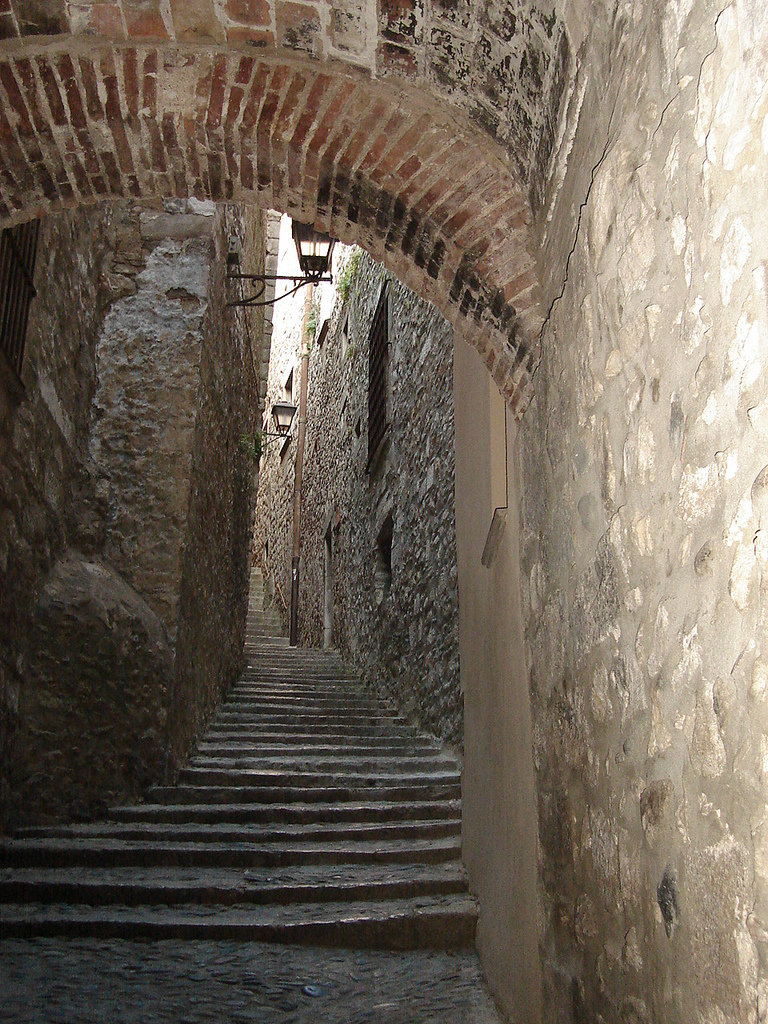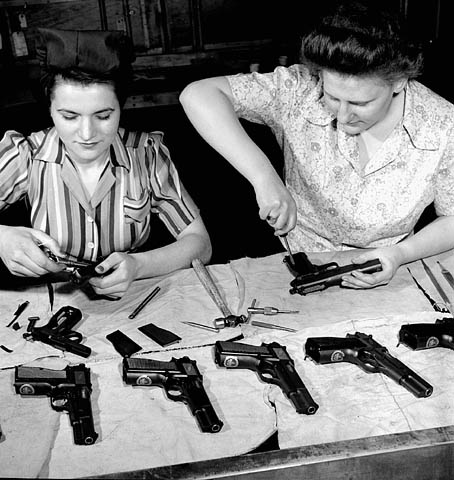|
María García Torrecillas
María García Torrecillas (16 May 1916 – 3 February 2014) was a Spanish assistant nurse and mid-wife who assisted in the delivery of around 300 babies while in exile in Vichy France as a result of the Spanish Civil War. Part of a generation of young people from Almeria seeking better opportunities in Catalonia, García and her sister moved to Barcelona to join their older brother. Initially working in a yarn factory, the events of July 1936 led her to working for a Republican munitions factory and volunteering at a hospital run by International Red Aid.. The fall of Barcelona in January 1939 made García part of the first large wave of people to flee the city towards the French border. Once arriving at the Argelès-sur-Mer concentration camp in France, García found herself pregnant in a situation where it was very difficult to give birth. With the Swiss Aid Association running the Elna Ward, García was helped with her pregnancy by Swiss nurse Elisabeth Eidenbenz. Eid ... [...More Info...] [...Related Items...] OR: [Wikipedia] [Google] [Baidu] |
Albánchez
Albanchez is a Municipalities of Spain, municipality of Almería (province), Almería province, in Spain. Demographics References External links *Albanchez Information- Tourist information for the town of Albanchez *- Diputación Provincial de Almería Search Almeria Information and business directory for Almeria in English & Spanish Municipalities in the Province of Almería {{Almería-geo-stub ... [...More Info...] [...Related Items...] OR: [Wikipedia] [Google] [Baidu] |
Evacuation Of Children In The Spanish Civil War
As the Spanish Civil War proceeded on the Northern front (from 1937 onwards), the Spanish Republican authorities arranged the evacuation of children, some of whom had insufficient documentation to enable their repatriation. Evacuations These Spanish War children were shipped to Britain, Belgium, the Soviet Union, other European countries and Mexico. These children were referred to as "Basque refugees", but included also non-Basques. They were embarked in Bilbao (Santurtzi) on boats chartered by the Basque government, loyal to the Republic. Those in Western European countries were able to return to their families after the war, but those in the Soviet Union, from Communist families, were forbidden to return – by Stalin and by Franco. The first opportunity for most of them to do so came in 1956, three years after Stalin's death. They lived in Soviet orphanages and were regularly transferred from one orphanage to another according to the progress of the Second World War. Thu ... [...More Info...] [...Related Items...] OR: [Wikipedia] [Google] [Baidu] |
Puigcerdà
Puigcerdà (; es, Puigcerdá) is the capital of the '' Catalan comarca'' of Cerdanya, in the province of Girona, Catalonia, northern Spain, near the Segre River and on the border with France (it abuts directly onto the French town of Bourg-Madame). History Puigcerdà is located near the site of a Ceretani settlement, which was incorporated into Roman territory. The Roman town was named Julia Libyca. Puigcerdà was founded in 1178 by King Alfonso I of Aragon, Count of Barcelona. In 1178 Puigcerdà replaced Hix as the capital of Cerdanya. Hix is now a village in the commune of Bourg-Madame, in the French part of Cerdagne. In the closing stages of the 1672-1678 Franco-Dutch War, the town was captured by a French army under the duc de Noailles but returned to Spain in the Treaties of Nijmegen. Puigcerdà was unique during the Spanish Civil War in having a democratically elected Anarchist council. The Portet-Saint-Simon–Puigcerdà railway was opened in 1929, crossin ... [...More Info...] [...Related Items...] OR: [Wikipedia] [Google] [Baidu] |
Girona
Girona (officially and in Catalan language, Catalan , Spanish: ''Gerona'' ) is a city in northern Catalonia, Spain, at the confluence of the Ter River, Ter, Onyar, Galligants, and Güell rivers. The city had an official population of 103,369 in 2020. Girona is the capital of the province of Girona, province of the same name and also capital of the ''Comarques of Catalonia, comarca'' of the Gironès and the vegueria of Girona. Since much of the old quarter of this ancient city has been preserved, Girona is a popular destination for tourists, and film productions have used it as a filming location (e.g. ''Game of Thrones''). The city is located northeast of Barcelona. History The first historical inhabitants in the region were Iberians; Girona is the ancient Gerunda, a city of the Ausetani. Later, the Ancient Rome, Romans built a citadel there, which was given the name of ''Gerunda''. The Visigoths ruled in Girona until it was conquered by the Moors in 715. Charlemagne reconquere ... [...More Info...] [...Related Items...] OR: [Wikipedia] [Google] [Baidu] |
El Diaro
EL, El or el may refer to: Religion * El (deity), a Semitic word for "God" People * EL (rapper) (born 1983), stage name of Elorm Adablah, a Ghanaian rapper and sound engineer * El DeBarge, music artist * El Franco Lee (1949–2016), American politician * Ephrat Livni (born 1972), American street artist Arts, entertainment, and media Fictional entities * El, a character from the manga series ''Shugo Chara!'' by Peach-Pit * El, short for Eleven, a fictional character in the TV series ''Stranger Things'' * El, family name of Kal-El (Superman) and his father Jor-El in ''Superman'' *E.L. Faldt, character in the road comedy film ''Road Trip'' Literature * ''Él'', 1926 autobiographical novel by Mercedes Pinto * ''Él'' (visual novel), a 2000 Japanese adult visual novel Music * Él Records, an independent record label from the UK founded by Mike Alway * ''Él'' (Lucero album), a 1982 album by Lucero * "Él", Spanish song by Rubén Blades from ''Caminando'' (album) * "Él" ... [...More Info...] [...Related Items...] OR: [Wikipedia] [Google] [Baidu] |
Andalusians
The Andalusians ( es, andaluces) are a European ethnic group, native to Andalusia, an autonomous community in southern Spain. Andalusia's statute of autonomy defines Andalusians as the Spanish citizens who reside in any of the municipalities of Andalusia, as well as those Spaniards who reside abroad and had their last Spanish residence in Andalusia, and their descendants. Since reform in 2007, the Andalusian statute of autonomy identifies the territory as a ''historic nationality'' in the preamble. The Spanish Language Academy recognizes Andalusian Spanish as a set of diverse dialects. History and culture In Antiquity, Andalusian people used to trade with Phoenicians and Sephardi Jews some thousand years before the Common Era, and they were called as Tarshish or Tartessos in the Old Testament and Greek texts. The genesis of modern Andalusian culture can be traced to the incorporation of the Moors territory to the Crown of Castile during the Middle Ages at the end of the Re ... [...More Info...] [...Related Items...] OR: [Wikipedia] [Google] [Baidu] |
Borders Of France
The French Republic has terrestrial borders with 10 sovereign states, 8 bordering Metropolitan France and 2 bordering the Overseas Departments The overseas departments and regions of France (french: départements et régions d'outre-mer, ; ''DROM'') are departments of France that are outside metropolitan France, the European part of France. They have exactly the same status as mainlan ... of France, totaling . In addition, the territories of France border an additional 5 countries and territories. List The lengths of the borders France shares with different countries and territories are listed below. Maritime borders are not all included. Metropolitan France Overseas Departments/Regions Overseas Collectives/Territories References {{France-geo-stub ... [...More Info...] [...Related Items...] OR: [Wikipedia] [Google] [Baidu] |
Corpo Truppe Volontarie
The Corps of Volunteer Troops ( it, Corpo Truppe Volontarie, CTV) was a Fascist Italian expeditionary force of military volunteers, which was sent to Spain to support the Nationalist forces under General Francisco Franco against the Spanish Republic during the Spanish Civil War, 1936–39. Background In July 1936, at the beginning of Spanish Civil War, most of the elite Nationalist forces were isolated in Spanish Morocco or on the Canary Islands. Meanwhile, in Spain, smaller formations of Nationalists and Guardia Civil forces were locked in combat with pro-government militias, Assault Guards and those army units which remained loyal to the leftist Popular Front government. Making the situation more difficult for the Nationalists was the fact that the Spanish Republican Air Force and Navy generally remained loyal to the government. If the Nationalist forces fighting in Spain did not receive reinforcements, the rebellion could soon fail. General Francisco Franco and the ot ... [...More Info...] [...Related Items...] OR: [Wikipedia] [Google] [Baidu] |
Arms Industry
The arms industry, also known as the arms trade, is a global industry which manufactures and sells weapons and military technology. It consists of a commercial industry involved in the research and development, engineering, production, and servicing of military material, equipment, and facilities. Arms-producing companies, also referred to as arms dealers, or as the military industry, produce arms for the armed forces of states and for civilians. Departments of government also operate in the arms industry, buying and selling weapons, munitions and other military items. An arsenal is a place where arms and ammunition - whether privately or publicly owned - are made, maintained and repaired, stored, or issued, in any combination. Products of the arms industry include guns, artillery, ammunition, missiles, military aircraft, military vehicles, ships, electronic systems, military communications, night-vision devices, holographic weapon sights, laser rangefinders, laser sights, ... [...More Info...] [...Related Items...] OR: [Wikipedia] [Google] [Baidu] |
Second Spanish Republic
The Spanish Republic (), commonly known as the Second Spanish Republic (), was the form of government in Spain from 1931 to 1939. The Republic was proclaimed on 14 April 1931, after the deposition of Alfonso XIII, King Alfonso XIII, and was dissolved on 1 April 1939 after surrendering in the Spanish Civil War to the Nationalist faction (Spanish Civil War), Nationalists led by General Francisco Franco. After the proclamation of the Republic, Provisional Government of the Second Spanish Republic, a provisional government was established until December 1931, at which time the Spanish Constitution of 1931, 1931 Constitution was approved. During this time and the subsequent two years of constitutional government, known as the First Biennium, Reformist Biennium, Manuel Azaña's executive initiated numerous reforms to what in their view would modernize the country. In 1932 the Jesuits, who were in charge of the best schools throughout the country, were banned and had all their propert ... [...More Info...] [...Related Items...] OR: [Wikipedia] [Google] [Baidu] |
La Voz De Almería
''La Voz de Almería'' is a Spanish language local daily newspaper published in Almería, Spain. It is one of the leading papers of the region. History and profile ''La Voz de Almería'' was established in 1939 as ''Yugo'', but its title was changed in 1962 after the beginning of the Francoist regime. The paper is headquartered in Almería. The publisher of the daily is Comercialización de Medios CM2000, S.A. In the late 1990s ''La Voz de Almería'' was read by both socialists and those with a right-wing political stance. Editors and contributors ''La Voz de Almería'' has been edited by José María Bugella, José Cirre Jiménez, Eduardo Molina Fajardo and Donato León Tierno. Its major contributors include Manuel del Águila, Eduardo del Pino Vicente or José Ángel Tapia Garrido. See also *List of newspapers in Spain This list of newspapers in Spain includes daily, weekly Spanish newspapers issued in Spain. In 1950 the number of daily newspapers in circulation i ... [...More Info...] [...Related Items...] OR: [Wikipedia] [Google] [Baidu] |
Barcelona
Barcelona ( , , ) is a city on the coast of northeastern Spain. It is the capital and largest city of the autonomous community of Catalonia, as well as the second most populous municipality of Spain. With a population of 1.6 million within city limits,Barcelona: Población por municipios y sexo – Instituto Nacional de Estadística. (National Statistics Institute) its urban area extends to numerous neighbouring municipalities within the and is home to around 4.8 million people, making it the [...More Info...] [...Related Items...] OR: [Wikipedia] [Google] [Baidu] |





